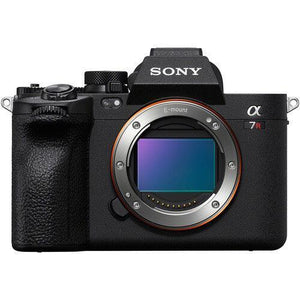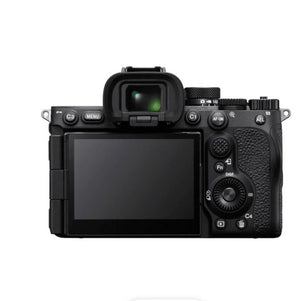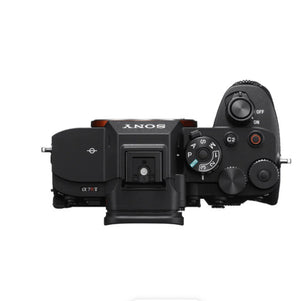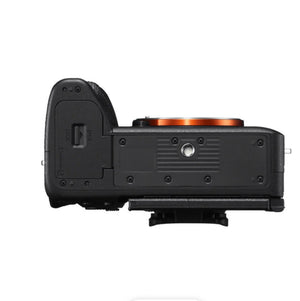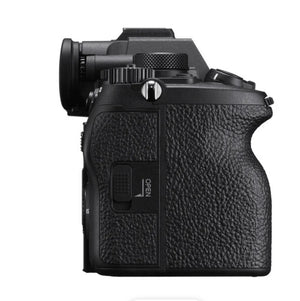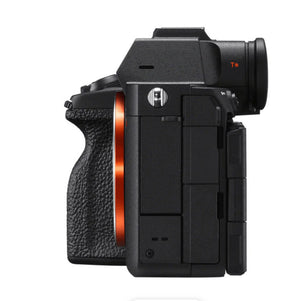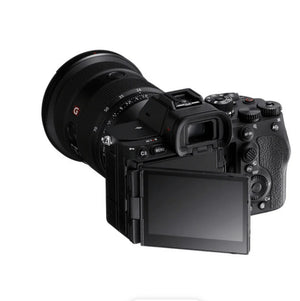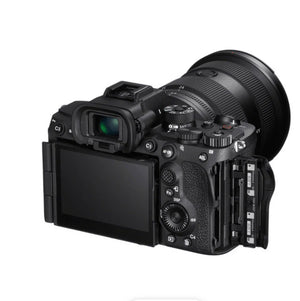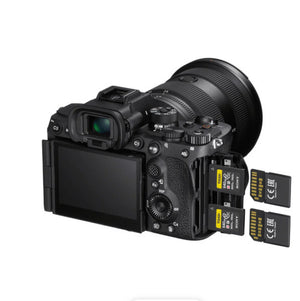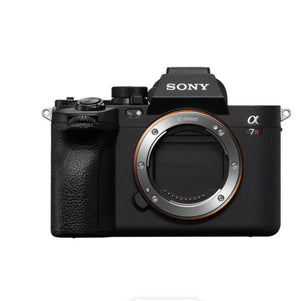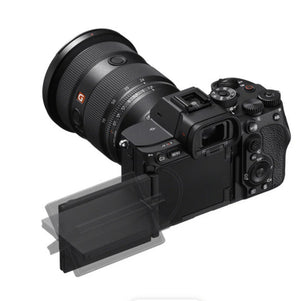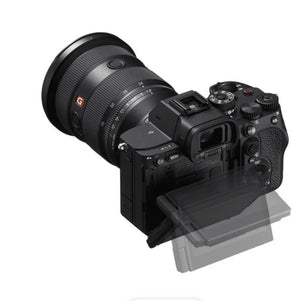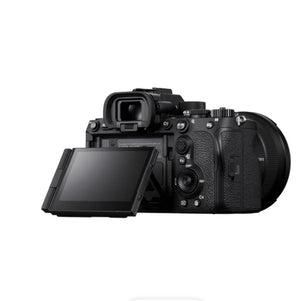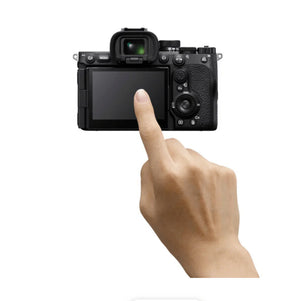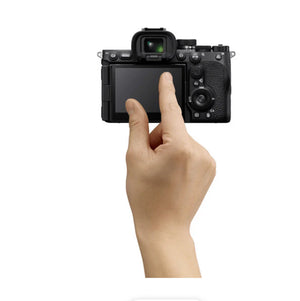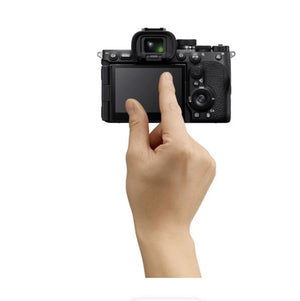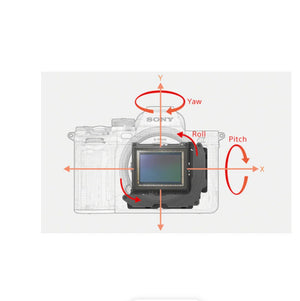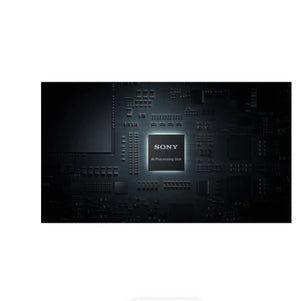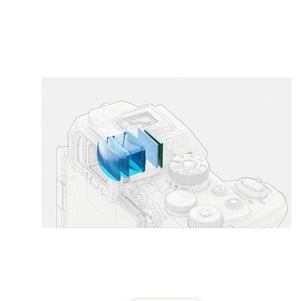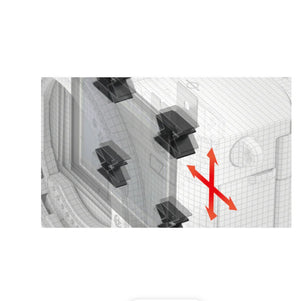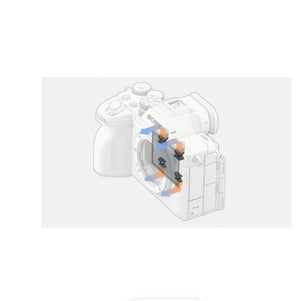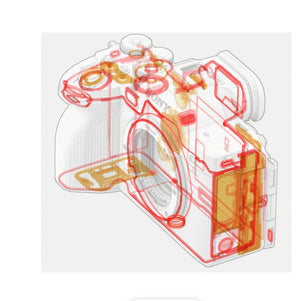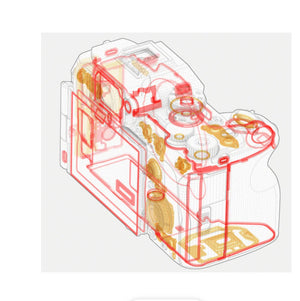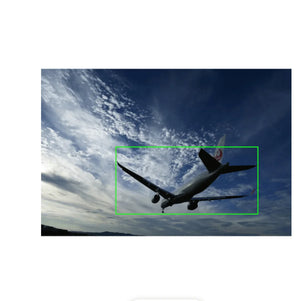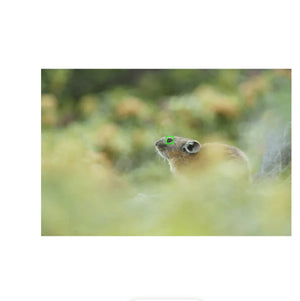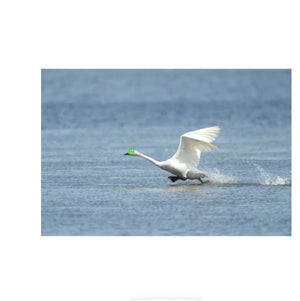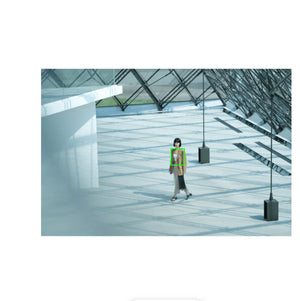Sony a7R V Mirrorless Camera
- 61MP Full-Frame Exmor R BSI CMOS Sensor
- BIONZ XR & AI Processing Unit
- AI-Based Real-Time Tracking AF System
- 8K 24p, 4K 60p, FHD 120p 10-Bit Video
- 4K 16-Bit Raw Output; S-Log3/S-Cinetone
- 9.44m-Dot EVF with 120 fps Refresh Rate
- 3.2" 4-Axis Multi-Angle Touchscreen LCD
- 10 fps Shooting with AF/AE Tracking
- 8-Stop 5-Axis Image Stabilization
- Dual CFexpress Type A/SD Card Slots
Sony a7R V Mirrorless Camera

Special Financing | Shoot Now - Pay Later!
Get the gear you want today and pay tomorrow with one of our special financing programs.
Sony a7R V Mirrorless Camera
Combining resolution and precision, the Sony a7R V is the mirrorless camera designed for those who crave detail. Featuring a 61MP full-frame sensor, all-new AI-based autofocus system with advanced subject recognition, 8K video recording, and 8-stop image stabilization, the fifth-generation a7R is reliable and well-rounded for both photography and video applications.
Exmor R BSI Sensor and BIONZ XR Processor
61MP Full-Frame CMOS Sensor
Featuring a back-illuminated design, this full-frame 61MP Exmor R CMOS sensor offers a mixture of incredible resolution with high clarity, low noise, and a wide 15-stop dynamic range. The sensor's structure promotes impressive image quality and a copper wiring layer dramatically improves data transmission speed for creating 14-bit, high-resolution 61MP stills with a native sensitivity range from ISO 100-32000, which can be further expanded to ISO 50-102400.
Improved Processing Engine
A new BIONZ XR processing engine offers up to 8x greater processing performance compared to previous generations, which enables faster overall performance, impressive image quality with wide sensitivity and dynamic ranges, and more fluent processing that's capable of handling a bevy of AI tasks and intelligent AF alongside imaging processes. This processing system also reduces rolling shutter and other motion distortions for clean rendering of moving subjects.
In terms of shooting speeds, the sensor and processor enable up to 10 fps shooting, at full resolution with a mechanical shutter, for up to 583 consecutive compressed raw frames, with full-time AF/AE. If shooting JPEG only, more than 1000 frames can be recorded in a single burst.
Updated 5-Axis Image Stabilization
Pixel Shift Multi Shooting
This unique compositing mode allows you to achieve even greater resolution than the 61MP sensor affords. Working in conjunction with the sensor-shift image stabilization, this mode shifts the sensor while making 16 consecutive exposures in order to acquire approximately 240.8MP of information for greater color accuracy and detail than possible with a single exposure, along with an impressive image size of 19,008 x 12,672-pixels. These files can then be merged together during post-production by using the Sony Imaging software suite.
Accurate Exposure and Color
Next Generation AI-Based Autofocus
AI Processing Unit
Using dedicated processing, the a7R V's autofocus is greatly benefitted by more intelligent subject tracking and recognition capabilities along with the reliable hybrid AF system Alpha cameras are known for. Real-time Recognition AF works with seven different selectable target types:
Real-time Tracking benefits from AI-based subject recognition for following moving subjects, making it particularly well-suited to sports and action subjects. Also, Human pose estimation allows the camera to distinguish between multiple people and maintain focus on the targeted subject; even if someone crosses in front, the camera maintains focus on the key person.
Advanced Fast Hybrid AF
AF During Video Recording
Video Recording
8K 24p and 4K 60p Support
Recording Flexibility
Advanced Color Control
Body Design and Connectivity
9.44m-Dot EVF and 4-Axis Multi-Angle Touchscreen LCD
Versatile and Durable Design
Ports and Interface
Connectivity
- Sony a7R V Mirrorless Camera
- Sony NP-FZ100 Rechargeable Lithium-Ion Battery (2280mAh)
- Sony BC-QZ1 Battery Charger
- Sony ALC-B1EM Body Cap for E-Mount Cameras
- USB Type-C to Type-A Cable
- Cable Protector
- Shoulder Strap
- Accessory Shoe Cap
- Eyepiece Cup
- Limited 1-Year Warranty
| Imaging | |
|---|---|
| Lens Mount | Sony E |
| Sensor Resolution | Actual: 62.5 Megapixel Effective: 61 Megapixel (9504 x 6336) |
| Sensor Type | 35.7 x 23.8 mm (Full-Frame) MOS |
| Image Stabilization | Sensor-Shift, 5-Axis |
| Built-In ND Filter | None |
| Capture Type | Stills & Video |
| Exposure Control | |
| Shutter Type | Electronic Shutter, Mechanical Focal Plane Shutter |
| Shutter Speed | Mechanical Shutter 1/8000 to 30 Seconds 1/8000 to 1/4 Second in Movie Mode |
| Bulb/Time Mode | Bulb Mode |
| ISO Sensitivity | Photo 100 to 32,000 in Manual, Auto Mode (Extended: 50 to 102,400) Video 100 to 12,800 in Auto Mode 100 to 32,000 in Manual Mode |
| Metering Method | Center-Weighted Average, Highlight Weighted, Multiple, Spot |
| Exposure Modes | Aperture Priority, Manual, Program, Shutter Priority |
| Exposure Compensation | -5 to +5 EV (1/3, 1/2 EV Steps) |
| Metering Range | -4 to 20 EV |
| White Balance | 2500 to 9900K Presets: Auto, Cloudy, Custom, Daylight, Flash, Fluorescent, Incandescent, Shade, Underwater |
| Continuous Shooting | Mechanical Shutter Up to 10 fps at 61 MP for up to 583 Frames (Raw) / 1000 Frames (JPEG) Electronic Shutter Up to 7 fps at 61 MP |
| Interval Recording | Yes |
| Self-Timer | 2/5/10-Second Delay |
| Still Image Capture | |
| Image File Format | JPEG, Raw |
| Bit Depth | 14-Bit |
| Video Capture | |
| Internal Recording Modes | H.265/XAVC HS/XAVC S-I 4:2:2 10-Bit UHD 8K (7680 x 4320) at 23.98/25 fps UHD 4K (3840 x 2160) at 23.98/25/29.97/50/59.94 fps 1920 x 1080 at 100/119.88 fps |
| External Recording Modes | Raw 16-Bit via HDMI UHD 4K (3840 x 2160) at 23.98/29.97/59.94 fps |
| Sensor Crop Modes | Super35 / APS-C 4K (3840 x 2160) |
| Fast-/Slow-Motion Support | Yes |
| Gamma Curve | HDR-HLG, S Cinetone, Sony S-Log 2, Sony S-Log 3 |
| Recording Limit | None |
| Broadcast Output | NTSC/PAL |
| IP Streaming | None |
| Built-In Microphone Type | Stereo |
| Interface | |
| Media/Memory Card Slot | Dual Slot: CFexpress Type A / SD (UHS-II) |
| Video I/O | 1 x HDMI Output |
| Audio I/O | 1 x 1/8" / 3.5 mm TRS Stereo Headphone Output 1 x 1/8" / 3.5 mm TRS Stereo Microphone Input |
| Power I/O | 1 x USB-C Input |
| Other I/O | 1 x USB-C (USB 3.2 / 3.1 Gen 2) Data Output (Shared with Power Input) 1 x PC Sync Socket Output 1 x Sony Multi/Micro-USB (USB 2.0) Control Input/Output |
| Wireless | 2.4 / 5 GHz MIMO Wi-Fi 5 (802.11ac) Bluetooth |
| Global Positioning (GPS, GLONASS, etc.) | None |
| Monitor | |
| Size | 3.2" |
| Resolution | 2,095,000 Dot |
| Display Type | 4-Axis Tilting Touchscreen LCD |
| Viewfinder | |
| Type | Built-In Electronic (OLED) |
| Size | 0.64" |
| Resolution | 9,437,184 Dot |
| Eye Point | 25 mm |
| Coverage | 100% |
| Magnification | Approx. 0.9x |
| Diopter Adjustment | -4 to +3 |
| Focus | |
| Focus Type | Auto and Manual Focus |
| Focus Mode | Continuous-Servo AF, Manual Focus, Single-Servo AF |
| Autofocus Points | Photo, Video Phase Detection: 693 |
| Autofocus Sensitivity | -4 to +20 EV |
| Flash | |
| Built-In Flash | No |
| Flash Modes | Auto, Fill Flash, Hi-Speed Sync, Off, Rear Sync, Red-Eye Reduction, Slow Sync |
| Flash Compensation | -3 to +3 EV (1/3, 1/2 EV Steps) |
| Dedicated Flash System | TTL |
| External Flash Connection | Hot Shoe, X-Sync Terminal |
| Environmental | |
| Operating Temperature | 32 to 104°F / 0 to 40°C |
| General | |
| Battery Type | 1 x NP-FZ100 Rechargeable Lithium-Ion, 7.2 VDC, 2280 mAh |
| Tripod Mounting Thread | 1 x 1/4"-20 Female (Bottom) |
| Accessory Mount | 1 x Hot Shoe Mount on Camera Body |
| Material of Construction | Magnesium Alloy |
- Sony a7R V Mirrorless Camera
- Sony NP-FZ100 Rechargeable Lithium-Ion Battery (2280mAh)
- Sony BC-QZ1 Battery Charger
- Sony ALC-B1EM Body Cap for E-Mount Cameras
- USB Type-C to Type-A Cable
- Cable Protector
- Shoulder Strap
- Accessory Shoe Cap
- Eyepiece Cup
- Limited 1-Year Warranty



























